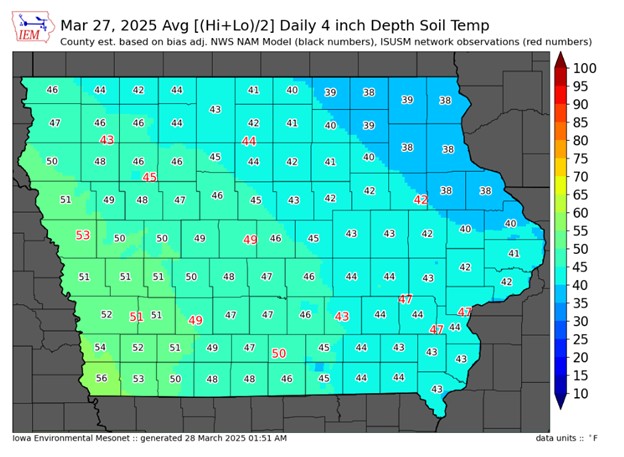Legislators continued to work hard in Week 11 of the 2025 Iowa Legislative Session as the second funnel deadline rapidly approaches. This week featured long caucus meetings followed by floor debate, and the long-awaited property tax legislation passed through subcommittee.

Week 11 Snapshot
As bills make their way through the legislative process ahead of the second funnel deadline, both chambers spent the majority of their time in respective caucuses and debating bills on the floor. The House spent most of the day in caucuses and started floor debate well into the afternoon nearly every day this week. In Week 11, the House passed 40 bills, sending 39 to the Senate and 1 to the Governor. The bill heading to Governor Reynolds relates to hands-free driving, which was an expressed priority in her Condition of the State. The bill, which passed 84-11 in the House and 47-1 in the Senate, prohibits all use of hand-held electronic device usage while driving.
In the opposite chamber, the Senate enjoyed another shorter debate calendar and gaveled in and out on Thursday before adjourning early for the week. Despite a short calendar, the Senate passed 39 bills, sending 36 to the House and 3 to the Governor. Notably, the chamber unanimously passed HF 782, Governor Reynold’s proposed cell phone ban in schools. The bill was amended to remove charter schools and to include a timeline for the development of cell phone restriction materials. The bill must pass the House as amended to go to the Governor.
| Number | Bill Description | Action |
| SF 507 | Prohibits cities and counties from engaging in DEI programs or having DEI offices | Passed Senate 34-15, Goes to House |
| SF 394 | Establishes a liability defense for usage of EPA-approved pesticides | Passed Senate 26-21, Goes to House |
| HF 884 | Authorizes schools to employ chaplains to provide services to students | Passed House 57-39, Goes to Senate |
| HF 970 | Appropriates $1 million to Double Up Food Bucks program and requires HHS to submit a federal waiver to limit SNAP to foods meeting certain nutritional standards. Amended to make corrections regarding beverages. | Passed House 56-40, Goes to Senate |
| HF 872 | Expands the definition of targeted small businesses to those with a gross annual income of less than $10 million | Passed House 96-1, Goes to Senate |
| SF 473 | Prohibits HHS from requiring foster or adoptive parents to affirm policies on gender identity and orientation and allows these beliefs to be taken into account when placing a child | Passed Senate as Amended 34-14, Goes to House |
Bill to Establish Work Requirements Advances
SF 615 would require Iowa to receive a federal waiver to impose work requirements for participants in the Iowa Health & Wellness Plan. If passed and a waiver is granted, the bill would require a person to work 80 hours each month, unless exempted, and directs the Department of Health and Human Services (HHS) to discontinue benefits if work requirements are turned down.
The bill passed the Senate 33-15 on Tuesday, and the following day the House amended the bill to establish a review of the Medicaid for Employed Persons with Disabilities Program and to require HHS to file a report by December of this year. The amended bill passed 61-35 and will need to pass as amended out of the Senate to head to the Governor.
Property Tax Legislation Advances
Addressing property taxes was identified as a legislative priority for both parties. At the end of week 8, Representative Bobby Kaufmann and Senator Dan Dawson, the chairs of the Ways and Means Committees in their respective chambers, introduced HSB 313 and SSB 1208 to overhaul the property tax process. After its introduction, the Chairs waited two weeks to schedule a subcommittee to allow input, holding meetings to discuss the legislation, its impact, and ways to improve it.
In packed subcommittee rooms, key stakeholders provided testimony, restating their commitment to being good partners in producing quality property tax policy. The stated purpose of the Property Tax Reform plan is to seek to make the property tax process more transparent, fair, and predictable. That being the case, some stakeholders expressed concerns about the proposed 2% growth limitation, future economic development, and availability of city services. In an effort to continue conversations toward a workable solution, both subcommittees signed off on the legislation with the caveat that this legislation is not yet in its final form.
Soil Temperature
Like most states, Iowa’s legislative calendar is based around the planting and growing season. The legislature convenes in January and typically adjourns in April or early May. During this time, the soil is typically frozen over or too cold to plant. Due to the unseasonably warm weather, the soil temperature has increased, along with the pressure on the legislators who are farmers (of which there are many) to get out in the field and plant.

According to Iowa State University Soil Monitoring, the current soil temperatures around the state are in the 40s and 50s in the majority of the state. It is recommended to begin planting corn and soybeans when the soil temperature is at 50 degrees Fahrenheit, so there may be pressure from the farmer legislators to adjourn the session on time.
What’s next?
The second and final legislative funnel is next week April 4. Bills must pass through a committee in the opposite chamber from which they originated, which also means they must be passed by either the full House or Senate. An exception to this rule is if a “companion” bill has passed committee in each chamber those bills are considered through the second funnel. Also, appropriations, ways and means, and administrative rules bills are “funnel-proof” and exempt from this deadline.
Tax reform and budgeting will be the focus of the coming weeks and will be crucial to negotiations leading up to sine die, the final day of session. With the March Revenue Estimating Conference (REC) estimates out, we expect both chambers to produce budget targets soon, which will prompt Appropriations Chairs to begin working out their budgets. Once a final agreement on budgets is reached between the House, the Senate, and the Governor’s office, budget bills will be amended and approved accordingly by each chamber before being sent down to the Governor’s Office.
The full 2025 Session Timetable can be found here.




